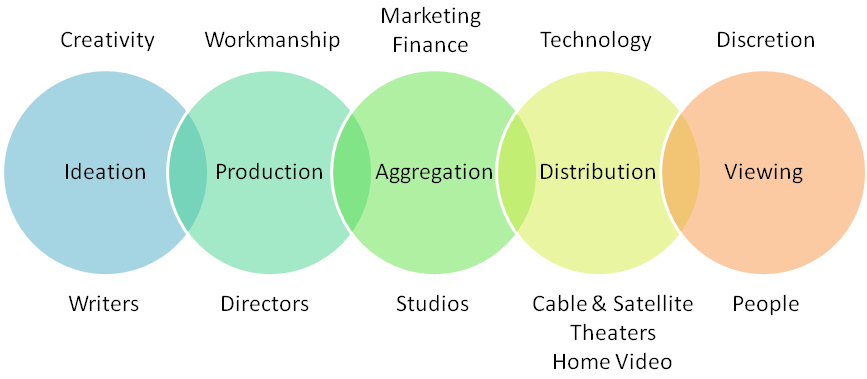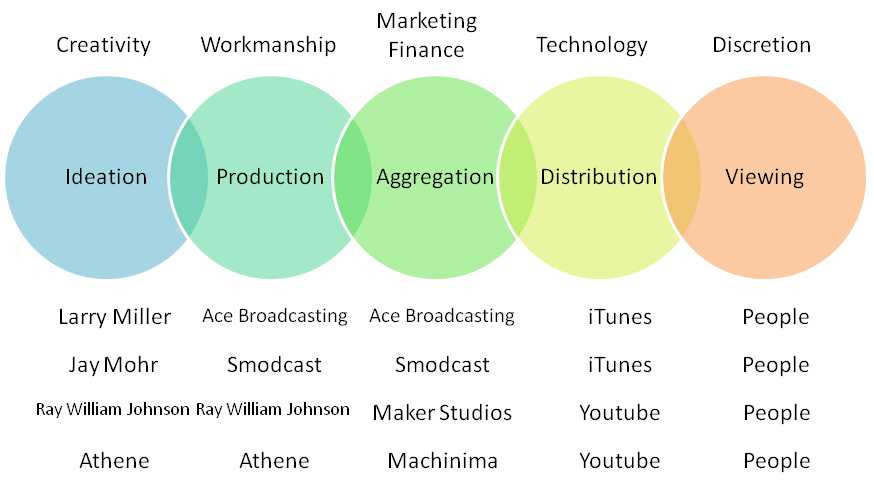The new hotness is to talk about how “the Internet” is going to “kill Hollywood” and that “old media is dead”.
A few of the posts I’m referring to are from smart, sharp people like Marc Suster, Paul Graham, and Rex Sorgatz. They vary a little in theme, but all discuss the basic idea that the old way of doing business in television and film is going to change at a fundamental level. Accelerating the thinking is the clash over copyright which is really a clash over revenue generation and competition.
While people are right to see significant change coming to how media is distributed and consumed, they are wrong to think that changes in technology are going to destroy the basic processes that exist today in what is considered “Hollywood”.
Let’s look at a model of how ideas become shows and movies.
The Five Steps
Ideation – The creation of new stories, concepts or presentation of existing ideas into a new package that would be engaging to viewers. This is the realm of the writers and producers where the cool, new stuff is conceived.
Production – The actual creation of the film or television program. This is the realm of the director, actor, cinematographer, musician, gaffer, best boy, make-up artist, special effects, and an endless amount of other experts in specific fields where experience and technique is required.
Aggregation – The process of sorting the bad from the good and the marketing of the good to people. This is the realm of the Studios, green lighting films and shows, helping coordinating in the realms of Production and Distribution, and most importantly, making people aware of what is being created. This is the “Hollywood” that many speak of with derision.
Distribution – The process of getting films and shows to people that want them. This is the realm of cable & satellite providers, theaters, digital distribution, “piracy”, and plastic discs.
Viewing – The consumption of creative product by people. Taking a variety of forms, it’s entertainment for people in a plethora of genres and forms.
Skills That Power The Steps
Creativity – New concepts and ideas are the engine of the entire entertainment industry. Without creativity, entertainment stagnates, becomes repetitive, and fails to attract an audience.
Workmanship – Expertise, innovation, and precision are what create immersive and engaging entertainment. Without workmanship, there can be no ‘suspension of disbelief’.
Marketing – Helping people understand the new entertainment being created and framing it into something people think will have value is essential to getting new ideas into the world. Without marketing, the entire process would fail as people are not motivated to try new entertainment.
Distribution – Getting content to people in a variety of formats and delivery methods. Without distribution, even the greatest stories remain untold.
Discretion – In the end it’s the decision of the viewing public as to whether content is good and has value to them seen in the form of ratings, box office receipt, purchases. Without viewer discretion, good things don’t surface and bad things stick around.
Who Exactly Are You Trying to Kill?
Now that the model is clear, let’s examine what part of this would be affected by “the Internet”. The recent calls to “kill” are almost solely focused on Technology. That means new and alternative ways to distribute content. So the key idea is that the rapid pace of change in technology is going to bring down the Hollywood studios.
Let’s look at that claim in context of the technology change in the 20th century.
The modern studio structure begins in the early 20th century with movie theaters as primary distribution.
- Broadcast Television comes along, studios adapt, create content for it, turn it into a billion dollar industry.
- Cable Television comes along, studios adapt, create content for it, turn it into a billion dollar industry.
- VHS Tape comes along, studios adapt, create content for it, turn it into a billion dollar industry.
- DVDs comes along, studios adapt, create content for it, turn it into a billion dollar industry.
- Digital Downloads comes along, studios adapt, create content for it, turn it into a billion dollar industry.
- Internet streaming video comes along, studios adapt, create content for it, and are in the process of turning it into a billion dollar industry.
Changes and innovation in technology alone are not going to “kill Hollywood”. Do you really think that the content producers can’t or won’t adapt to the new distribution methods and revenue models? Of course they will. They have every time in the past. Change is hard, so first they fight it and then they accept it and turn it into a billion dollar business.
Competition, not Assassination.
Let’s look at some of the new, innovative companies out there that are pointed to as examples of new media, Maker Studios and Machinma. Often they are heralded as the “future of television”. They make some great stuff, I watch plenty of it, but they are following the exact same overall model as the big Hollywood studios.
Ray William Johnson – Ideation, Production
Maker Studios – Marketing, Finance
Youtube – Distribution
Athene – Ideation, Production
Machinima – Marketing, Finance
Youtube – Distribution
You could swap out a different distribution method and it wouldn’t affect the other steps. The model continues and the new studios become more like the older studios.
Even in podcasting, you are seeing the rise of podcast studios like those from Kevin Smith and Adam Carolla, using exactly the same model. Even podcast coming out of the tech space like Revision3 and TWiT follow the model.
Looking at gaming, we see exactly the same model occur as well. The studio Activision owns and markets Blizzard/World ofWarcraft and Infinity Ward/Call of Duty games and distributes via download and discs. The studio EA owns and markets The Sim Studio/Sims games and distributes via download and discs.
Yes, improvements in technology make to the other steps of the model easier, but they don’t break the model. All of the transitions in technology may change how content is created, distributed, and viewed, but they don’t kill anything except old technology.
Perhaps a new form of entertainment will emerge, but it won’t be from the technology side. New entertainment comes from the creativity side. With Silicon Valley and Alley so focused on the next technology, they don’t have much knowledge or experience in start-ups focusing on creativity. There is no minimal viable product in entertainment.
Billions of Dollars, Waiting to be Picked Up
The modern studio system is full of inefficiency, bloat, tradition, groupthink, and plenty of just plain stupidity, but it does get the job done and remains orders of magnitude more popular and profitable than any other form of entertainment. The industry is so focused on playing defense and guarding the backdoor against piracy, that people with good new ideas can simply walk in the front door and Hollywood will think they’re there to help.
There is a huge role for technology start-ups to play in improving and innovating in the world of entertainment, but it starts with understanding how entertainment go from ideas to eyeballs and working with experts in other areas rather than stating they want to kill them.


